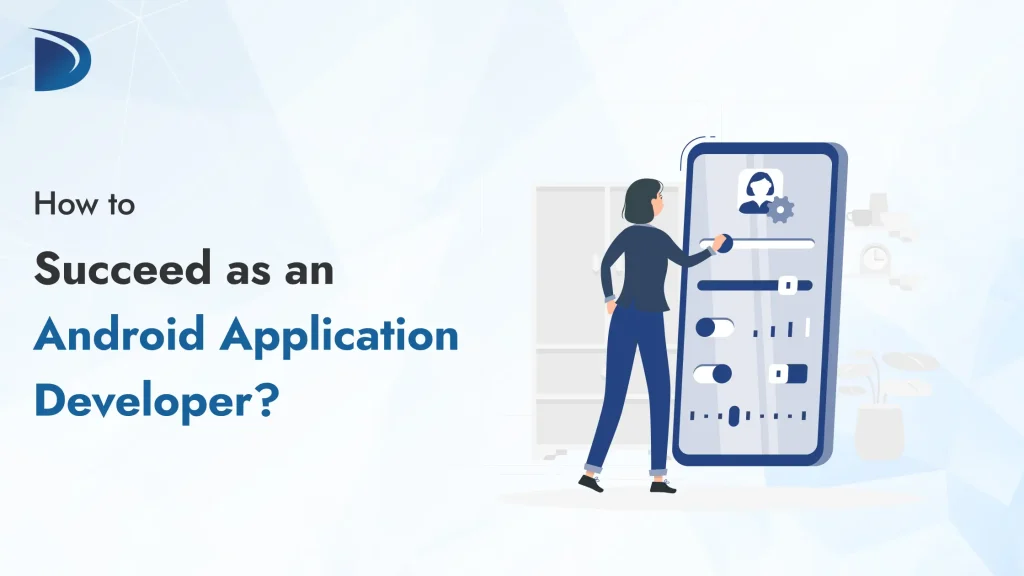Table of Contents
Becoming a successful Android app developer requires more than understanding coding and structures. It also involves mastering various tools, staying up to date with industry trends, and creating apps that deliver a seamless user experience. This blog outlines 10 essential steps to help you grow as a professional Android application developer and achieve long-term success.
10 Key Skills to Become a Successful Android App Developer
1. Master the Fundamentals: Learn Kotlin and Java
Android development is primarily based on Kotlin and Java. Kotlin is Google’s official language for Android applications because of its concise syntax, improved performance, and enhanced safety features. However, Java remains widely used in many projects. Learning both languages increases flexibility and ensures compatibility with existing codebases.
Kotlin offers features such as null safety, coroutines for asynchronous programming, and extension capabilities that simplify development. In contrast, Java provides robust object-oriented programming concepts that remain relevant in many legacy Android applications. Understanding the differences and benefits of each language will help you choose the most suitable approach for each project.
2. Get Familiar with Android Studio & SDK
Android Studio is the official Integrated Development Environment (IDE) used by most Android app development companies. It provides powerful tools for writing, testing, and debugging applications. Learning to navigate Android Studio efficiently can significantly reduce development time.
The Android Software Development Kit (SDK) includes essential components such as libraries, APIs, and emulators. Tools like Gradle, Logcat, and the Android Virtual Device (AVD) streamline development. The SDK also provides platform-specific features, enabling developers to build applications optimized for different device configurations and versions.
3. Understand UI/UX Best Practices
User experience is crucial to the success of any mobile application. A well-designed interface improves usability, engagement, and retention. Learning UI frameworks and XML-based layouts enables developers to create intuitive and visually appealing designs.
Material Design guidelines help maintain consistency in Android apps by providing recommendations for colors, typography, motion, and component behavior. It is also important to consider accessibility features such as screen readers, high-contrast modes, and touch-friendly navigation to ensure everyone has a positive experience.
4. Master API Integration & Backend Connectivity
Many applications rely on backend services to retrieve and manage data. Understanding how to use RESTful APIs is essential for apps that require features such as user authentication, data synchronization, or access to external data sources.
Libraries such as Retrofit and Volley simplify API communication by efficiently managing network requests. Firebase provides a backend-as-a-service platform with features like authentication, real-time databases, and cloud storage. Learning GraphQL can also be beneficial for efficient data retrieval, especially in apps that require complex and flexible queries.
5. Optimize App Performance
For users to stay, your app must perform well. When mobile apps developed by a professional company load quickly and run smoothly, users stay satisfied and their phone batteries last longer.
Here’s how developers can boost performance:
- Handle tasks that do not require immediate screen updates in the background.
- Fix memory leaks using tools such as LeakCanary.
- Reduce wasted computing power by using caching methods.
- Reduce the size of images and other resources to minimize the app’s size and loading time.
Profiling tools, such as Android Profiler, allow developers to analyze CPU usage, memory management, and network activity. This helps them identify and fix performance bottlenecks.
6. Implement Security Best Practices
Security is essential in application development, especially for apps that handle private user information. Without strong security, you risk data breaches and unauthorized access.
To enhance security:
- Use OAuth and Firebase Authentication for secure logins.
- Encrypt sensitive data stored locally with AES encryption.
- Implement SSL/TLS protocols for secure network communication.
- Use ProGuard to obfuscate code and prevent reverse engineering.
Following Google’s security best practices is a smart move. It helps you meet data protection standards and boosts user confidence in your app.
7. Learn Version Control with Git
If you are a developer, version control is essential. It lets you to track code changes, collaborate with other developers, and manage different project versions efficiently. Git, along with platforms such as GitHub, GitLab, and Bitbucket, simplifies teamwork and code backups.
To excel in your career as a successful Android app developer, you need to master Git commands such as commit, push, pull, merge, and branch management. Understanding how to resolve code conflicts, create pull requests, and set up continuous integration (CI/CD) pipelines will streamline your development process and improve code quality.
8. Test Your App Thoroughly
Ensuring a stable, bug-free application is essential, and testing plays a crucial role in this process. Android provides various testing frameworks to verify an app’s functionality, performance, and user experience.
The key techniques for testing are:
- Unit Testing: JUnit tests individual components and logic.
- UI Testing: Espresso automates interaction testing with Android UI components.
- Instrumentation Testing: UI Automator checks compatibility across different devices.
- Manual Testing: This identifies edge cases and usability issues before the app is released.
An app that is thoroughly tested will have fewer crashes, leading to higher user satisfaction and better app store ratings.
9. Publish and Optimize on Google Play Store
Releasing an app on the Google Play Store requires compliance with Google’s policies and guidelines. Developers must create an appealing app listing with a detailed description, high-quality screenshots, and an engaging promotional video.
App Store Optimization (ASO) helps improve visibility and downloads.
Strategies include:
- Select relevant keywords for the title and description.
- Encourage positive reviews and ratings.
- Use A/B testing to optimize marketing elements.
- Monitor analytics to track user engagement and retention.
Regular updates with new features, performance improvements, and bug fixes help maintain user interest and can enhance the long-term success of an app.
10. Keep Learning and Stay Updated
Android development is a constantly evolving field, with frequent updates, new libraries, and emerging technologies. Staying current with industry trends is essential to keep your skills relevant.
Here are some ways to stay updated:
- Follow the official Android Developer Blog by Google.
- Join development communities on platforms such as Stack Overflow, Reddit, and GitHub.
- Attend conferences like Google I/O and DroidCon.
- Explore new frameworks, including Jetpack Compose and Kotlin Multiplatform.
Continuous learning enables developers to adapt to changes, enhance their skills, and stay competitive in the industry.
Conclusion
To establish yourself at the center of Android app development, you need technical expertise, problem-solving skills, and adaptability. By mastering core programming languages, staying updated on new tools, and optimizing app performance, you can create high-quality applications that stand out in the competitive app market.
Whether you are starting your career or looking to enhance your skills, these ten steps provide a clear path to becoming a skilled Android app developer. With dedication and continuous learning, you can create practical and innovative applications that benefit both users and businesses.
FAQs
1. How long does it take to become an Android app developer?
The time required to become a successful Android app developer depends on your experience. With dedicated and consistent learning, a beginner can achieve proficiency in about 6 to 12 months.
2. Is Kotlin better than Java for Android development?
Kotlin is currently the preferred language because of its modern features, but Java remains relevant and is still widely used in many projects.
3. How can I improve my app’s performance?
Enhance performance by optimizing background processes, minimizing memory leaks, implementing caching, and using profiling tools such as Android Profiler.
4. What are the best tools for API integration in Android apps?
Developers commonly use Retrofit, Volley, and Firebase as their preferred tools for API integration.
5. What should I focus on for app security?
Use authentication protocols, encryption techniques, SSL/TLS, and ProGuard to protect user data.

